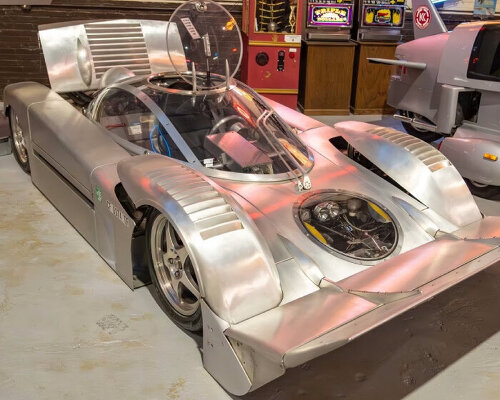amphibious car Sea Lion Prototype has side pods
The Sea Lion Prototype is dubbed the world’s fastest amphibious car at the time of its creation in 2012, which uses retractable side pods to float on water. A part of the Larry Klairmont Collection in the Klairmont Kollections Automotive Museum in Chicago, the vehicle uses a Mazda 13B rotary engine with a displacement of 1.3 liters. The engine is equipped with a Camden supercharger and a Holley carburetor, and it is this power unit that drives the wheels for land operation and links it to a marine jet system when the vehicle is in the water. The transmission of power to the jet unit allows the same engine to serve both modes without changing the main drive source.
From the get-go, it is visible that the hull and frame are built from aluminum alloy, with all of their sections CNC-milled and TIG-welded during assembly. The amphibious car Sea Lion Prototype comes with a monocoque section fused to the body at the center of the car to create a single load-bearing structure, and the body includes front and rear fenders that attach directly to the main shell. The use of aluminum reduces overall weight and resists corrosion during water exposure. For operation on land, the car functions as a low two-seat road vehicle. When the driver prepares for water entry, hydraulic actuators pull the front wheels up into the wheel wells. This clears the lower edge of the vehicle and prevents drag in the water, while the side pods, mounted along the flanks on the side, extend outward by mechanical arms, doubling as cargo holders and flotation devices for the vehicle.
all images courtesy of Mecum Auctions
Vehicle in Klairmont Kollections Automotive Museum collection
The amphibious car Sea Lion Prototype was designed and built by Marc Witt and SeaRoader Aquatic not as a mass-production model but as an experimental build. Part of the aim was to test how a rotary engine, a jet pump, and a rigid aluminum chassis could work together in a dual-purpose machine, so the team selected the 13B rotary because of its small size and high power output. The jet pump received new housing and alignment to fit the car’s hull. The movement in water then comes from a Berkeley 12 JC jet drive pump, which draws water through an intake at the rear and expels it at high speed through a nozzle to produce thrust.
Controls inside the cockpit include pedals, a gear selector, and an instrument cluster for land travel. A second set of levers operates the jet pump intake and the position of the steering nozzle, while the fighter-style stick standing between the seats allows the pilot to navigate moving over water. Entry is by a single opening in the top shell, and the seating and controls stay fixed. In a listing by Mecum Auctions, the amphibious car Sea Lion Prototype forms part of the Larry’s Legacy Collection at the Klairmont Kollections Automotive Museum in downtown Chicago.
the Sea Lion Prototype is dubbed the world’s fastest amphibious car at the time of its creation in 2012
the vehicle recently became a part of the Klairmont Kollections Automotive Museum collection in downtown Chicago
a glimpse at the cabin of the vehicle
view of the fighter-style stick
detailed view of the engine cover
t is visible that the hull and frame are built from aluminum
view of the engine with see-through glass
view of the wheel
the vehicle comes with a monocoque section fused to the body
project info:
name: Sea Lion Prototype
design: Marc Witt and SeaRoader Aquatic
listing: Mecum Auctions | @mecum_auctions
The post world’s fastest amphibious car sea lion prototype uses retractable side pods to float on water appeared first on designboom | architecture & design magazine.

